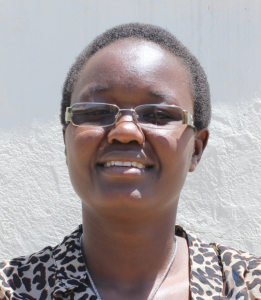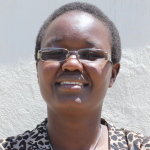The area around Bukhakunga Primary School is green and well-vegetated. The school is located near the Bukhakunga market, where community members carry out different businesses. The rural area is quite busy, too, because of the trucks carrying sugarcane and the motorbikes used as the means of transportation in the area.
Bukhakunga Primary School was started in 1952 by the community members. At the time and before Bukhakundga, pupils were walking long distances to other schools more than five kilometers away. The long distance made parents fear their children's safety because they would have to cross dangerous roads and rivers to get to school. Following its establishment, Bukhakunga Primary became sponsored by Roman Catholic Church, which assisted the school to grow and to be registered by the government. Today, there are 1,190 students and 22 teachers and staff.
The school currently has no water source on campus. They have two small plastic and concrete rainwater tanks, but neither has worked since the school returned from the last holiday break. Even when these tanks did work, however, they never came close to meeting all of the school's water needs. This has forced the school to instruct pupils to carry water from home and a nearby unprotected spring every morning as they come to school.
The pupils are also forced to go either home again or to the spring throughout the day when the school runs out of water. The spring is about 600 meters away from the school, and the path is precarious for the pupils because they have to cross the main road. This is very dangerous because the trucks carrying sugarcane, motorbikes, and vehicles use the same road. In either case, each walk to get water takes the students out of school and away from their studies. The students use more energy which they are supposed to use in class to fetch water. They get tired and lack attention during class hours because they are tired of carrying water to school, and as a result, they perform poorly in class.
"As a school Head Teacher, it affects me psychologically because sending the pupils to go home or to the spring to fetch water during class hours is not right. The school needs more water for washing hands and the latrines during this pandemic, but there is no water. Lack of water in school has reduced general hygiene and sanitation to zero because we have no water to wash latrines, classrooms, and no safe water for consumption. Sometimes when I see my pupils càrryimg water, it hurts a lot because there is nothing I can do to help them," explained Head Teacher John Chiliswa Amwoka.
"I personally have no morale to learn because the environment is dirty. Being called during class time to fetch water is the worst experience that I am praying never to happen to my young siblings in the future. This is because it disrupts one's mind and concentration. I pray that one day our school will have clean and safe flowing water so that the next generation will not suffer as were are suffering," said student and young teenager Celine.
Relying on the young learners to supply the school with water brings into question the water quality they fetch because they all handle their water differently. The spring water is also not safe due to its unprotected state (we are working with the community to help protect their spring soon!). Consuming the combined water at school has made some pupils cough a lot, have stomachaches, typhoid, and flu, leading teachers to believe that the water students bring to school is not safe. When school parents take their children to the hospital, the diagnoses consistently show that the students' water could be the cause of their illnesses.
What We Can Do:
New Well
We conducted a hydrogeological survey at this school, and the results indicated the water table beneath it is an ideal candidate for a borehole well. Due to a borehole well's unique ability to tap into a safe, year-round water column, it will be poised to serve all of the water needs for this school's large population, even through the dry months.
The school will help collect the needed construction materials such as sand, rocks, and water for mixing cement. They will also provide housing and meals for the work team, in addition to providing local laborers. We will complement their materials by providing an expert team of artisans and drilling professionals, tools, hardware, and the hand-pump. Once finished, the school’s students and staff will use water from the well and staff for drinking, handwashing, cooking, cleaning, and much more.
The school and we strongly believe that all of these components will work together to improve standards at this school, which will help lead to better student academic performance and unlock the opportunity for these students to live better, healthier lives.
Handwashing Stations
The student health club will oversee the two new handwashing stations we will provide and ensure they are kept clean and working. The club leaders will fill the handwashing stations with water daily and make sure they are always supplied with a cleaning agent such as soap or ash.
VIP Latrines
Two triple-door latrine blocks will be constructed with local materials that the school will help gather. Three doors will serve the girls, and three doors will serve the boys. These new latrines will have cement floors designed to be easy to use and clean. And with a rain tank right on school property, there should be enough water to keep them clean.
Training on Health, Hygiene, COVID-19, and More
We will hold a one-day intensive training session with students, teachers, and parents. This training will cover a wide range of topics, including COVID-19 symptoms, transmission routes, prevention; personal and environmental hygiene; and the operation and maintenance of the rain tank, latrines, and handwashing stations. There will be a special emphasis on handwashing.
Our team of facilitators will use various methods to train, including participatory hygiene and sanitation transformation and asset-based community development. We will initiate a student health club, which will prepare students to lead other pupils into healthy habits at school and home. We will also lead lectures, group discussions and provide illustrative handouts to teach health topics and promote good hygiene practices within the school, including handwashing and water treatment. We will then conduct a series of follow-up training before transitioning to our regularly scheduled support visits throughout the year.

 Borehole Well and Hand Pump
Borehole Well and Hand Pump
 Rehabilitation Project
Rehabilitation Project






































